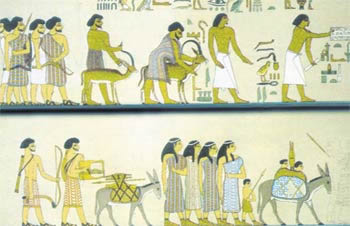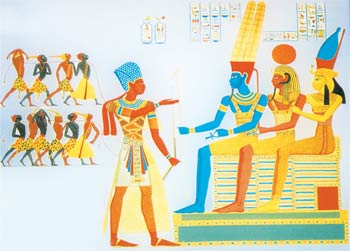Besides the city states established in Mesopotamia, Egyptian civilization was one of the most ancient civilizations in history. Ancient Egypt is known to have had the most organised social and political order of the time. Their invention of writing around 3000 B.C., their use of the river Nile, the deserts surrounding the country and serving as a strong defence against external threats were major factors in the successful progression of the Egyptian Civilization.
Nevertheless, this great civilization was ruled by Pharaoh, whose reign is clearly described in the Qur'an as an example of obstinacy. These people acted proudly against Allah, persisting in their denial of the religion. Therefore, even their advanced civilization, social and political order, and military achievements, could not protect them from destruction.
The most important events of the history of Egypt took place in connection to the presence of the children of Israel in the land.
 |
| The children of Israel were enslaved by Pharaoh in Egypt and subjected to hard labour. |
Israel is the other name of the Prophet Jacob (pbuh). The sons of Prophet Jacob (pbuh) had formed "the Children of Israel," the tribe which in time came to be known as "Jews." The children of Israel first came to Egypt during the time of the Prophet Joseph (pbuh), the youngest son of Prophet Jacob (pbuh). In the Qur'an, a detailed account of the life of Prophet Joseph (pbuh) is given in Surah Yusuf. Beginning in the early years of his life, Prophet Joseph (pbuh) had faced many difficulties and had been subjected to numerous assaults and slanders. Later in his life, after his release from prison by the decree of Allah where he had been put because of a false accusation, Prophet Joseph (pbuh) was placed in authority over the treasures of Egypt. His appointment was followed by the influx of the children of Israel into Egypt. Allah describes this in the Qur'an as follows:
Then when they entered into Joseph's presence, he drew his parents close to him and said, "Enter Egypt safe and sound, if Allah wills." ( Surah Yusuf: 99)
According to the account in the Qur'an, the children of Israel, who had dwelled in peace and security in Egypt, eventually lost their status in the society, and in time, were finally enslaved. From the related verses in the Qur'an we understand that the children of Israel lived in such a condition at the time the Prophet Moses (pbuh) arrived on the scene. As described in the Qur'an, the Prophet Moses (pbuh) went to Pharaoh as "a member of an enslaved tribe." The following arrogant answer, which Pharaoh and his inner circle made to the Prophet Moses (pbuh) and the Prophet Aaron (pbuh), informs us about this fact:
They said, "What! Should we believe in two human beings like ourselves when their people are our slaves?" (Surat al-Muminun: 47)
 |
| An ancient Egyptian mural painting depicting the entry of the children of Israel into Egypt. |
As depicted in these verses, the Egyptians had subjected the children of Israel to slavery and placed them in their personal service. To maintain and enforce this system of slavery, the Egyptians employed methods of repression. This pressure was exercised to the extent of controlling the entire Israelite population. The proliferation of the male population, deemed to be a challenge to the Egyptian's own survival, was obstructed, whilst the female population was exploited for their service. Allah relates this fact in the verses:
Remember when We rescued you from the people of Pharaoh. They were inflicting an evil punishment on you—slaughtering your sons and letting your women live. In that there was a tremendous trial for you from your Lord. (Surat al-Baqara: 49)
Remember when We rescued you from Pharaoh's people who were inflicting an evil punishment on you, killing your sons and letting your women live. In that there was a tremendous trial from your Lord. (Surat al-A'raf: 141)
The superstitious religion that was prevalent in the land of Egypt was the legacy of the idolatrous practices of Pharaoh's ancestors. (Surely Allah is beyond that) This unjust religion posited the existence of numerous gods. Pharaoh was, on the other hand, believed to be a supposed living god. It was precisely this belief which proffered pharaohs with such power over their subjects. Pharaoh and his immediate circle saw the Prophet Moses (pbuh) as a threat to the way of life dictated by the deviant religion of their ancestors, since, according to that religion, it was Pharaoh who possessed all the might and glory. Pharaoh's arrogance, his striving to maintain control, and his regarding the Prophet Moses (pbuh) and the Prophet Aaron (pbuh) as rivals, are evidenced in the following words of Pharaoh and his immediate circle, in their address to the Prophet Moses (pbuh) and the Prophet Aaron (pbuh). Allah relates this in the Qur'an as follows:
They said, "Have you come to us to turn us from what we found our fathers doing, and to gain greatness in the land? We do not believe you." (Surah Yunus: 78)
In accordance with his ancestors' perverted religion, Pharaoh claimed that he was a so-called god. (Allah is beyond that). He even went to such lengths as to claim he was their most exalted Lord. (Allah is beyond that). Allah informs us about this perverse attitude of Pharaoh in the below verse:
(Pharaoh) saying, "I am your Lord Most High!" (Surat an-Nazi'at: 24)
Because of their superstition, Pharaoh and his inner circle saw themselves as so-called divine beings. (Allah is beyond that). Their arrogance stemmed from the fact that they were far from the love, care and compassion, which are precepts commanded by the original religion. As a consequence of their arrogance, they believed themselves to have the right to resort to cruelty. Their mentality is conveyed in the following verse:
…to Pharaoh and his ruling circle. But they were proud and were a haughty people. (Surat al-Muminun: 46)
Pharaoh exercised such a great influence over the people of Egypt that all submitted themselves completely to him. They believed Pharaoh was the sole possessor of the entire land of Egypt and the Nile river:
 |
| An ancient Egyptian mural depicting the enslavement of the children of Israel in Egypt. In the foreground is Pharaoh and his inner circle, and in the background you can see the slaves with ropes around their necks. |
Pharaoh called to his people, saying, "My people, does the kingdom of Egypt not belong to me? Do not all these rivers flow under my control? Do you not then see?" (Surat az-Zukhruf: 51)
The Nile was correctly said to be life for Egypt. All of Egypt depended on the Nile for agriculture. She irrigated the crops, provided potable water for animals and people alike. According to Pharaoh and his inner circle, the sole owner of these waters and the land itself was Pharaoh. Everyone in Egypt acquiesced to his power and complied to his rule.
In order to secure his power and reduce his people to submission, Pharaoh had divided them into factions and, by the help of his trusted advisors among them, ruled over these weakened groups. In a verse, Allah draws our attention to this situation:
Pharaoh exalted himself arrogantly in the land and divided its people into camps, oppressing one group of them by slaughtering their sons and letting their women live. He was one of the corrupters. (Surat al-Qasas: 4)
Prior to the birth of the Prophet Moses (pbuh), Egypt was a land of depravity and corruption. Based purely on racial discrimination, people were enslaved and tortured. Without apparent justification, Pharaoh decreed that all male sons born to his Israelite subjects should be killed. Moreover, plunged into arrogance and cruelty, he saw himself as a so-called god on earth. (Allah is beyond that) By way of an established system of rule, Pharaoh held everything under his control and made people adhere to him.
It was under these circumstances that the Prophet Moses (pbuh) was sent by Allah as a messenger, to bring about an end to the oppression and cruelty, to remind people that He is our Lord, teach them the original religion, and rescue the children of Israel from captivity.